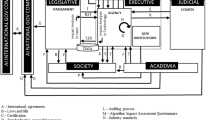Abstract
Recently, there has been a heavy debate in the US about the government’s use of data mining in its fight against terrorism. Privacy concerns in fact led the Congress to terminate the funding of TIA, a program for advanced information technology to be used in the combat of terrorism. The arguments put forward in this debate, more specifically those found in the main report and minority report by the TAPAC established by the Secretary of Defense to examine the TIA issue, will be analysed to trace the deeper roots of this controversy. This analysis will in turn be used as a test case to examine the adequacy of the usual theoretical frameworks for these kinds of issues, in particular the notion of privacy. Whereas the dominant theoretical framing of the notion of privacy turns around access to information, most of the core arguments in the debate do not fit in this kind of framework. The basic disagreements in the controversy are not about mere access, they involve both access and use. Furthermore, whereas the issue of access by itself refers to a more or less static situation, the real disagreements much more concern the organisational dynamics of the use of information, the mechanisms in the organisation that control these dynamics, and the awareness present within the organisation of the ‘social risks’ these dynamics represent. The bottom line question is whether the assessment of these gives sufficient reason for trust.
Similar content being viewed by others
References
ACLU (American Civil Liberties Union). Total information compliance: The TIA’s burden under the Wyden Amendment. A preemptive analysis of the government’s proposed super surveillance program, May 19, 2003
Y Alexander (2001) Terrorism: a Definitional Focus Y Alexander E.H Brenner (Eds) Terrorism and the Law Transnational Publishers Ardsley, NY
F.A.J Birrer (2001) Applying Ethical and Moral Concepts and Theories to IT Contexts: Some Key Problems and Challenges R.A Spinello H.T Tavani (Eds) Readings in Cyberethics Jones & Bartlett Computer Science Sudbury, MA 91–97
F.A.J Birrer (2004) Statistical Evidence: Responsibilities and the Burden of Proof C Dijkum Particlevan J Blasius H Kleijer B Hilten Particlevan (Eds) Recent Developments and Applications is Social Research Methodology SISWO Amsterdam
F.A.J Birrer (2000) Computer Technology, Subliminal Enticement, and the Collectivisation of Ethics D.G Johnson J.H Moor H.T Tavani (Eds) Computer Ethics: Philosophical Enquiry (CEPE 2000 Proceedings) Dartmouth College Dartmouth
W.T. Coleman, Jr. Separate Statement of William T. Coleman. TAPAC, 2004
M DeRosa (2004) Data Mining and Data Analysis for Counterterrorism Center for Strategic and International Studies (CBIS) Report Washington, DC
DARPA (Defense Advanced Research Projects Agency). Report to Congress regarding the Terrorist Information Awareness Program (in response to Consolidated Appropriations Resolution, 2003, Pub. L. No. 108-7, Division M, § 111 (b)), May 20, 2003
Executive Committee ACM SIGKDD (Association For Computing Machinery, Special Interest Group on Knowledge, Discovery & Data Mining). `Data mining’ is NOT against civil liberties. June 30, 2003 (revised July 28, 2003)
GAO (General Accounting Office). Data mining. Federal efforts cover a wide range of uses. GAO Report 04-548, GAO, Washington, DC, 2004
D Hand H Mannila P Smyth (2001) Principles of Data Mining MIT Press Cambridge, Mass
N. Kranich, Commentary: MATRIX and the new surveillance states: the multistate anti-terrorism information exchange. Free Expression Policy Project, October 16, 2003
J Mena (2004) Homeland Security. Techniques and Technologies Charles River Media Hingham, Mass
Office of the Inspector General, Department of Defense. Information technology management: Terrorism Information Awareness program (D-2004-033). Department of Defense, December 2003
W. Safire, You are a suspect. New York Times, November 14, 2002, p. A 35
InstitutionalAuthorNameTAPAC (Technology and Privacy Advisory Committee) (2004) Safeguarding Privacy in the Fight Against Terrorism Department of Defense Washington, DC
K.A Taipale (2003) ArticleTitleData Mining and Domestic Security: Connecting the Dots to Make Sense of Data Columbia Science and Technology Law Review 5 IssueID2 1–83
P.B Thompson (2001) ArticleTitlePrivacy, Secrecy and Security Ethics and Information Technology 3 13–19 Occurrence Handle10.1023/A:1011423705643
USACM (US Public Policy Committee of the Association for Computing Machinery). Letter to John Warner and Carl Levin. (resp. chairman and member of the Senate Committee on Armed Services). January 23, 2003
D.J. Whittaker (Ed.) The Terrorism Reader, Routledge, London, 2001
I.A Witten E Frank (2000) Data Mining Morgan Kaufmann San Francisco
Author information
Authors and Affiliations
Corresponding author
Rights and permissions
About this article
Cite this article
Birrer, F.A.J. Data Mining to Combat Terrorism and the Roots of Privacy Concerns. Ethics Inf Technol 7, 211–220 (2005). https://doi.org/10.1007/s10676-006-0010-6
Issue Date:
DOI: https://doi.org/10.1007/s10676-006-0010-6



